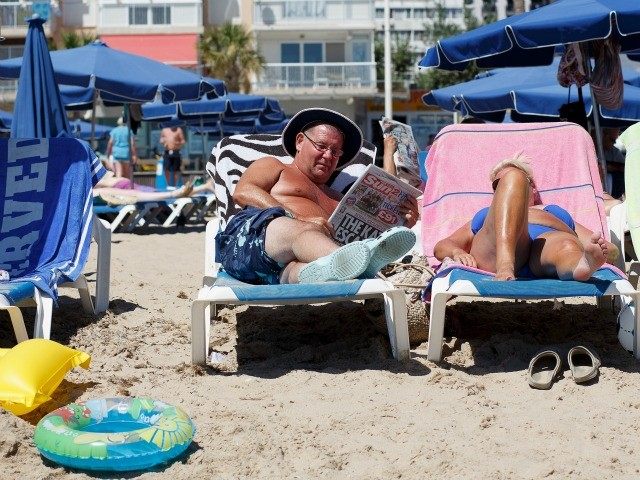FUENGIROLA, Spain (Reuters) – For some sun-seeking Britons, a cloud has formed over the whitewashed villages, beach bars and golf courses of Spain – the risk that Britain will drop out of the European Union.
Over the last three decades, hundreds of thousands of Britons have used the EU’s right to free movement to settle in Spain, drawn by warmer weather, cheaper property and a new life.
But the implications of a referendum on EU membership that Prime Minister David Cameron has promised by 2017 are troubling some of the 800,000 Britons who have made Spain their home.
They worry about what a British exit from Europe, or “Brexit”, would mean for health care, pensions, work permits and whether they will have to consider taking Spanish citizenship. The answers are far from clear.
“It’s very scary, I’ve been here 31 years,” said Valerie Luber, 75, a retired British nanny, at a coffee morning held by British-run Age Care in Calahonda on Spain’s southern Costa del Sol.
To the west of the ancient city of Malaga, an imported British way of life is evident along the 80-plus miles (130 km) of sandy beaches which are framed by hillsides dotted with olive tees sloping down to the Mediterranean.
There are English pubs with darts leagues, fish-and-chip shops and pawnbrokers offering “cash for gold” in coastal towns, where news-stands sell English language newspapers. Another attraction for some is that alcohol is cheaper than in Britain.
There are 12 British schools in this region, almost as many daily direct flights from Britain to Malaga as there are trains between London and Manchester, and “For Sale” signs in English mark empty building plots.
BRITISH MIGRANTS
In the 1960s and 1970s, Britons began moving to Spain, some of them even on the run from the law with the Costa del Sol being christened “Costa del Crime”.
After Spain joined the EU in 1986, arrivals accelerated and by 2014 data showed the country had become the most popular destination for British migrants in the EU.
Many will not have a vote on the referendum on Europe as after 15 years of living abroad, British citizens lose their vote back home.
Should Britain vote to exit the EU it is unclear what sort of relationship the country would negotiate with the rest of Europe, its main trading partner, and what that means for the British who now live in Spain.
At a British-run lawn bowls club, John Morse, 72, a retired engineer who has lived in Spain for 8 years said he does not want to go back. “This is our home and England is just a place to get cold in,” he said.
“We have seen an interest in the referendum among British nationals living in Spain and what the outcome might mean,” said a spokesman for the British Embassy in Madrid. “We’re not going to speculate on the various scenarios that might follow.”
The biggest worry for many is likely to be healthcare. About 35 percent of the British residents officially registered in Spain are over 65.
UK pensioners registered as residents in Spain have free access to healthcare under a reciprocal EU deal, and without it, some couldn’t stay because they couldn’t afford to pay for it.
NO HOME IN ENGLAND
“Would there be this influx of us all having to go back to England? What would happen to a lot of people like myself that haven’t got a home in England?” worried Luber, who has had three hip replacement operations in Spain.
There is also a risk to the level of the state pension should the UK drop out of the EU. Outside the bloc, in countries like Australia, the government has frozen the level of state payouts for retired Britons.
Working-age Britons in Spain hope that in the event of Brexit, an agreement could be reached to allow them to continue living and working there. Such a deal could also help the 93,000 Spaniards who live in Britain.
Most British migrants recognise they are beneficiaries of the EU’s free movement principles and dread the struggle they could face if Britain leaves the club.
Spain only issues work permits to non-EU citizens for certain occupations and if no other Spanish or EU candidate can be found, and they can take up to eight months to come through.
There is an alternative – adopting Spanish nationality.
“I’ve lived out of Britain for so long, so essentially, if push came to shove, I guess I would apply for Spanish citizenship and get a Spanish passport,” said Catriona Hogan, 49, a marketing director, who moved to Spain 16 years ago and is fluent in the language.
(By Sarah Young; Editing by Guy Faulconbridge)

COMMENTS
Please let us know if you're having issues with commenting.